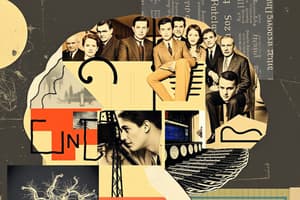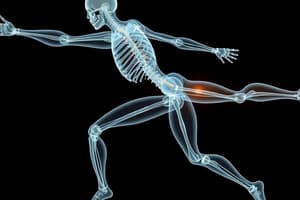Podcast
Questions and Answers
What is mainly controlled by action potentials initiated in the region mentioned?
What is mainly controlled by action potentials initiated in the region mentioned?
- Sensory perception and processing
- Voluntary movements of skeletal muscles (correct)
- Involuntary reactions of glandular tissues
- Automatic reflex actions
What is the primary role of the premotor area of the frontal lobe?
What is the primary role of the premotor area of the frontal lobe?
- Initiating emotional responses
- Regulating sensory input
- Organizing motor functions before initiation (correct)
- Controlling automatic body functions
Which type of descending tract has a direct connection between upper motor neurons and lower motor neurons?
Which type of descending tract has a direct connection between upper motor neurons and lower motor neurons?
- Peripheral tracts
- Direct tracts (correct)
- Reflex tracts
- Indirect tracts
What is the primary function of the basal nuclei mentioned?
What is the primary function of the basal nuclei mentioned?
Which nucleus is located deep within the cerebrum as part of the basal nuclei?
Which nucleus is located deep within the cerebrum as part of the basal nuclei?
What is a known effect of disorders in the basal nuclei?
What is a known effect of disorders in the basal nuclei?
What function does the prefrontal area primarily involve?
What function does the prefrontal area primarily involve?
Which description accurately differentiates between direct and indirect descending tracts?
Which description accurately differentiates between direct and indirect descending tracts?
What structure is primarily involved in regulating heart rate and blood vessel diameter?
What structure is primarily involved in regulating heart rate and blood vessel diameter?
Which part of the brainstem is responsible for relaying information between the cerebrum and the cerebellum?
Which part of the brainstem is responsible for relaying information between the cerebrum and the cerebellum?
Which structure is responsible for visual reflexes and receiving auditory input?
Which structure is responsible for visual reflexes and receiving auditory input?
What type of nerve tracts transmit action potentials from the brain to the spinal cord's motor neurons?
What type of nerve tracts transmit action potentials from the brain to the spinal cord's motor neurons?
Which of the following functions is specifically managed by the nuclei located in the pons?
Which of the following functions is specifically managed by the nuclei located in the pons?
The substantia nigra is part of which larger structure involved in regulating body movements?
The substantia nigra is part of which larger structure involved in regulating body movements?
Which portion of the brainstem connects the spinal cord to the remainder of the brain?
Which portion of the brainstem connects the spinal cord to the remainder of the brain?
Which region of the brainstem is the smallest?
Which region of the brainstem is the smallest?
Which type of neuron primarily carries signals from the motor areas of the cortex to the muscles?
Which type of neuron primarily carries signals from the motor areas of the cortex to the muscles?
What are descending tracts primarily responsible for in the nervous system?
What are descending tracts primarily responsible for in the nervous system?
Which physiological function is NOT controlled by the brainstem?
Which physiological function is NOT controlled by the brainstem?
Which structure is primarily involved in the coordination of voluntary movements and motor control?
Which structure is primarily involved in the coordination of voluntary movements and motor control?
What is the primary function of the pyramids found in the medulla oblongata?
What is the primary function of the pyramids found in the medulla oblongata?
What is the function of sensory areas of the cortex?
What is the function of sensory areas of the cortex?
What role do oligodendrocytes play in the central nervous system?
What role do oligodendrocytes play in the central nervous system?
In which area are the motor areas of the cortex primarily located?
In which area are the motor areas of the cortex primarily located?
Which cells protect neurons from heavy metals and toxins?
Which cells protect neurons from heavy metals and toxins?
What primarily determines the resting membrane potential of a neuron?
What primarily determines the resting membrane potential of a neuron?
Which type of channel is always open and allows passive movement of ions?
Which type of channel is always open and allows passive movement of ions?
Where are clusters of neuron cell bodies located in the peripheral nervous system referred to as?
Where are clusters of neuron cell bodies located in the peripheral nervous system referred to as?
Flashcards are hidden until you start studying
Study Notes
Nervous System Overview
- Action potentials originate in specific brain regions to control voluntary skeletal muscle movements.
- The premotor area organizes motor functions prior to initiation in the primary motor cortex.
- The prefrontal area is responsible for motivation and planning of movements, impacting emotional behavior and mood.
Descending Tracts
- Direct tracts: Extend from upper motor neurons in the cerebral cortex directly to lower motor neurons in the spinal cord.
- Indirect tracts: Do not have a direct link between cortical and spinal neurons.
Basal Nuclei
- A group of functionally related nuclei critical for movement coordination.
- Corpus striatum: Deep within the cerebrum, vital for motor planning and organization.
- Substantia nigra: Located in the midbrain, characterized by dark-pigmented cells; involved in regulating movements.
- Disorders in basal nuclei may lead to challenges in standing up from sitting and initiating walking.
Brain Regions
- Brainstem: Connects the spinal cord to the brain and consists of the medulla oblongata, pons, and midbrain, controlling vital functions.
- Cerebellum: Coordinates balance and muscle activity.
- Diencephalon and Cerebrum: Involved in various higher-level brain functions.
Brainstem Functions
- Medulla Oblongata: Regulates heart rate, blood pressure, and breathing; continuous with the spinal cord.
- Pons: Contains nerve tracts and nuclei that facilitate communication between the cerebrum and cerebellum; controls functions related to chewing and balance.
- Midbrain: Contains colliculi that mediate auditory and visual reflexes; plays a role in eye movement coordination.
Reticular Formation
- A network of nuclei scattered through the brainstem, involved in alertness and consciousness control.
Neural Cells and Structures
- Ependymal Cells: Line brain ventricles and produce cerebrospinal fluid (CSF); involved in neural tissue repair.
- Microglia: Mobile cells that become phagocytic during inflammation.
- Oligodendrocytes: Form myelin sheaths around CNS axons.
- Schwann Cells: Support and protect PNS axons by forming myelin sheaths.
- Satellite Cells: Surround and support neuron cell bodies in the PNS.
Electrical Signals in Neurons
- Membrane potentials arise due to ion concentration differences across cell membranes.
- Resting Membrane Potential: The voltage difference measured across the membrane in an unstimulated cell; primarily driven by potassium (K+), sodium (Na+), and negatively charged proteins.
- Ion Channels: Include leak channels (always open) and gated channels (open upon specific signals).
Nervous Tissue Organization
- Gray Matter: Composed of neuron cell bodies and dendrites; includes the cortex and nuclei.
- White Matter: Comprised of myelinated axons, appearing whitish, involved in nerve signal propagation.
Studying That Suits You
Use AI to generate personalized quizzes and flashcards to suit your learning preferences.




